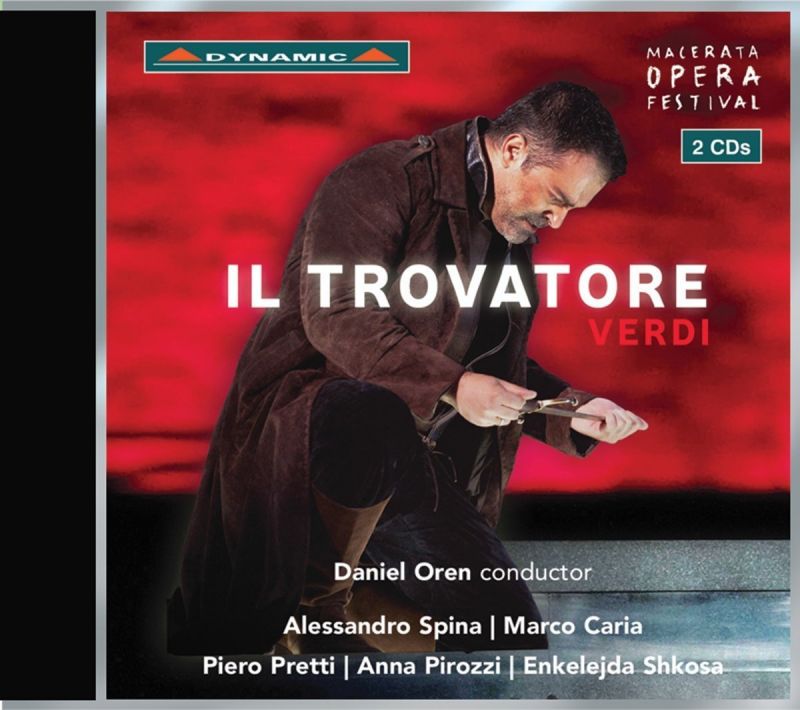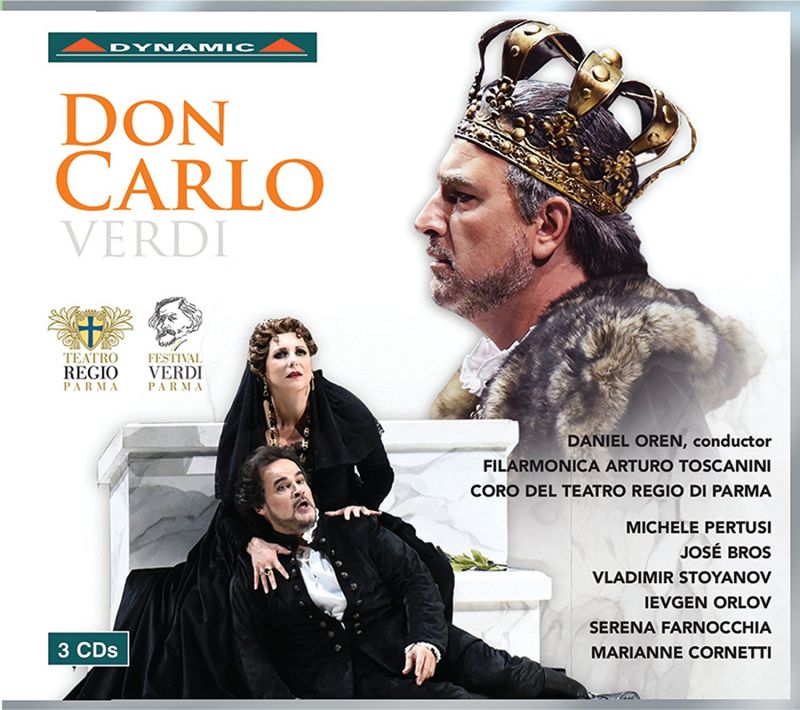VERDI Don Carlo. Il Trovatore (Daniel Oren)
View record and artist detailsRecord and Artist Details
Composer or Director: Giuseppe Verdi
Genre:
Opera
Label: Dynamic
Magazine Review Date: 10/2017
Media Format: CD or Download
Media Runtime: 129
Mastering:
DDD
Catalogue Number: CDS7769.02

Tracks:
| Composition | Artist Credit |
|---|---|
| (Il) trovatore |
Giuseppe Verdi, Composer
Anna Pirozzi, Leonora, Soprano Coro Lirico Marchigiano Daniel Oren, Conductor Enkelejda Shkosa, Azucena, Mezzo soprano Fondazione Orchestra Regionale delle Marche Giuseppe Verdi, Composer Marco Caria, Conte di Luna, Baritone Piero Pretti, Manrico, Tenor |
Composer or Director: Giuseppe Verdi
Genre:
Opera
Label: Dynamic
Magazine Review Date: 10/2017
Media Format: CD or Download
Media Runtime: 173
Mastering:
DDD
Catalogue Number: CDS7776 03

Tracks:
| Composition | Artist Credit |
|---|---|
| Don Carlo |
Giuseppe Verdi, Composer
Arturo Toscanini Philharmonic Orchestra Daniel Oren, Conductor Giuseppe Verdi, Composer Gregory Bonfatti, Conte di Lerma; Herald, Tenor Ievgen Orlov, Grand Inquisitor, Bass José Bros, Don Carlo, Tenor Lavinia Bini, Tebaldo, Soprano Marianne Cornetti, Princess Eboli, Mezzo soprano Marina Bucciarelli, Voice from Heaven, Soprano Michele Pertusi, Filippo II, Bass-baritone Parma Teatro Regio Chorus Serena Farnocchia, Elisabetta di Valois, Soprano Simon Lim, A Monk, Bass Vladimir Stoyanov, Rodrigo, Baritone |
Author: Hugo Shirley
Both shows feature Daniel Oren as conductor, a maestro who knows how each of the scores goes but doesn’t offer much else besides. He captures little of the driving rhythmic urgency that courses through Il trovatore’s veins and misses Don Carlo’s brooding grandeur. The orchestral playing in both performances is pretty rustic (a fine cello solo for Philip’s ‘Ella gammai m’amò’ notwithstanding), and pit-stage coordination cannot always be relied upon. The singing from the chorus in Macerata can waver tuning-wise; in Parma there just doesn’t seem to be enough of them.
These are solid performances, though, and the Don Carlo in particular offers encouraging signs that the Parma festival, which seemed to be in trouble a few years ago, might be back on an even keel. Cesare Lievi’s production charts a sensible course between period costumes and minimalist (and no doubt budget-conscious) sets. But while, for example, an oversize tomb for Carlo V, adorned with a wreath the size of a tractor tyre, does what it can to look imposing, there’s no getting away from the fact that this theatre’s stage really isn’t big enough to do this grand opéra justice.
The cast is led by a bright, tireless Don Carlo from José Bros, though one wishes he would vary his volume a little more often. He sings beautifully on the few occasions when he goes below forte, such as in his final duet with Serena Farnocchia’s authentically Italianate, touching Elisabeth. Michele Pertusi’s voice lies too high for Philip but he sings with authority, and Vladimir Stoyanov is a stylish Posa. Marianne Cornetti gives us an imposing, powerfully sung Eboli.
Francisco Negrin’s Trovatore is a more abstract affair conceived for a less conventional space, but it still feels essentially traditional. There are extras aplenty (including a lightly singed young boy at Azucena’s side), a chorus in threatening face paint, imaginative lighting and even some impressive pyrotechnics – although one struggles to keep track of the details on the small screen.
The direction of the singers is pretty rudimentary but Anna Pirozzi gives us a grandly sung Leonore (a role she has tackled at Covent Garden), which is matched by Piero Pretti’s robust Manrico. Marco Caria (Conte di Luna) is, alas, no stylist, but Enkelejda Skhosa brings plenty of voice and personality to Azucena.
The sound-only versions are non-starters, I’d say; but while there are more universally recommendable versions of both operas available on film – Luc Bondy’s French Don Carlos conducted by Antonio Pappano (Warner Classics, 4/01), or Karajan’s old-fashioned but gloriously sung Vienna Trovatore, recently reissued on Arthaus, 9/17) – both these releases represent respectable achievements.
Discover the world's largest classical music catalogue with Presto Music.

Gramophone Digital Club
- Digital Edition
- Digital Archive
- Reviews Database
- Full website access
From £8.75 / month
Subscribe
Gramophone Full Club
- Print Edition
- Digital Edition
- Digital Archive
- Reviews Database
- Full website access
From £11.00 / month
Subscribe
If you are a library, university or other organisation that would be interested in an institutional subscription to Gramophone please click here for further information.




